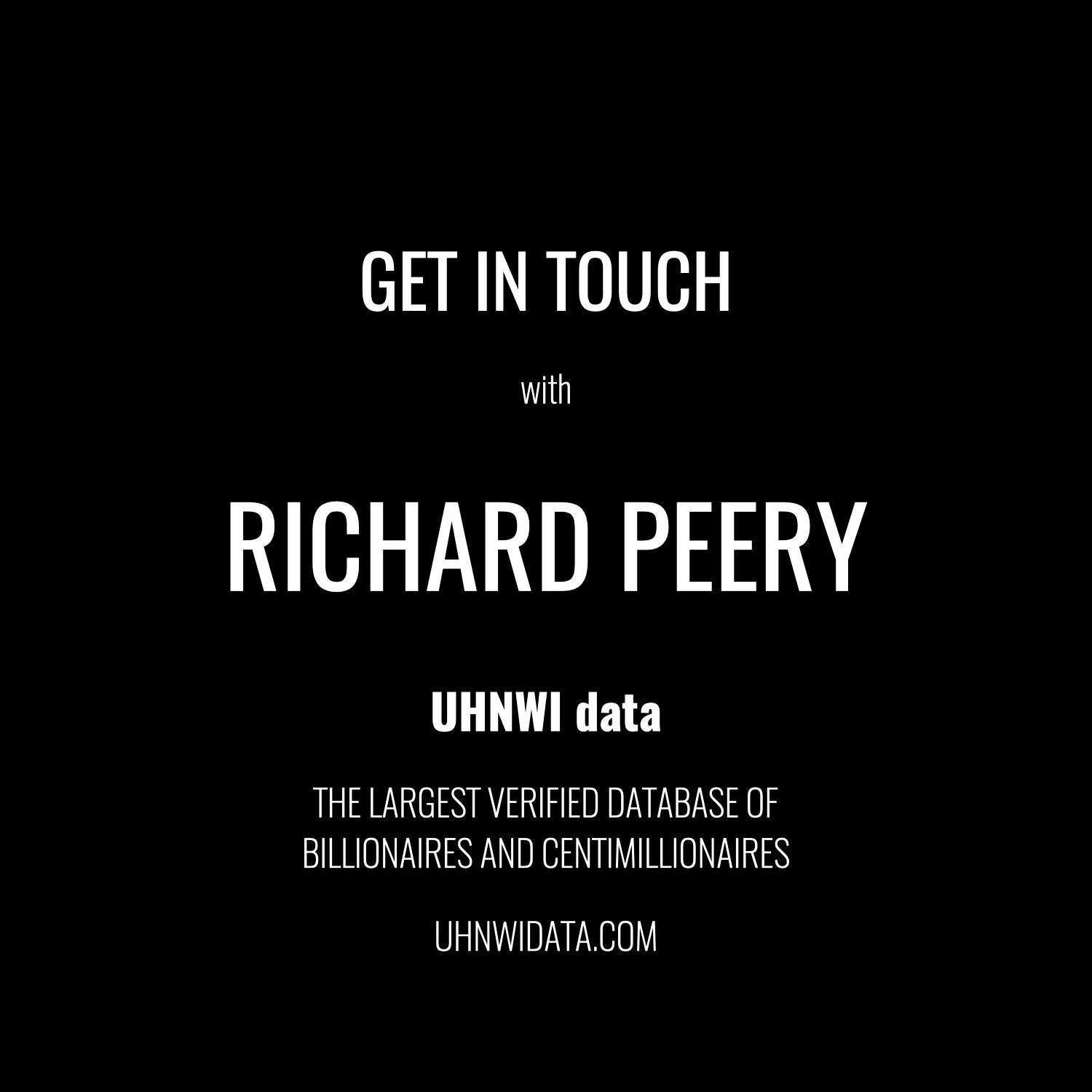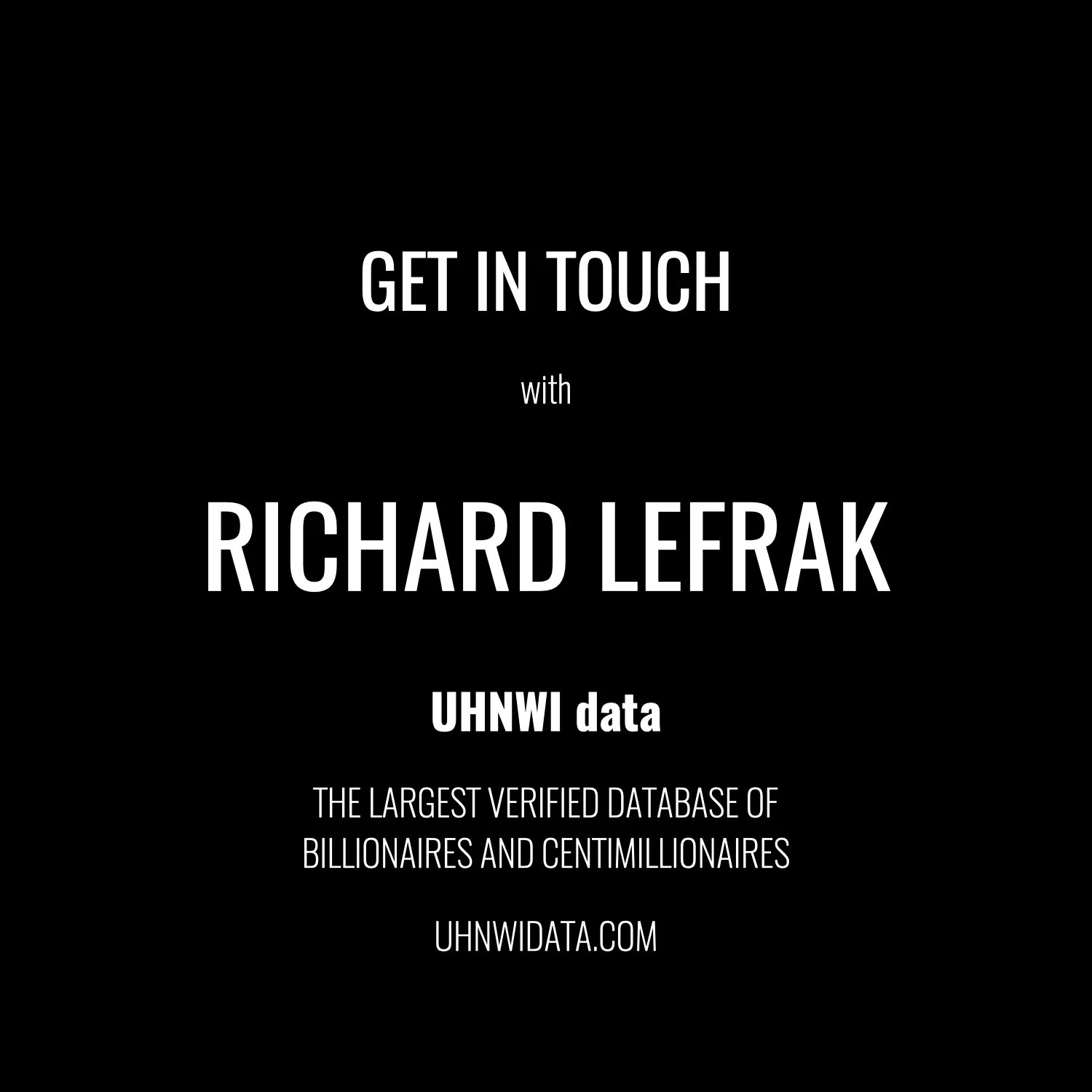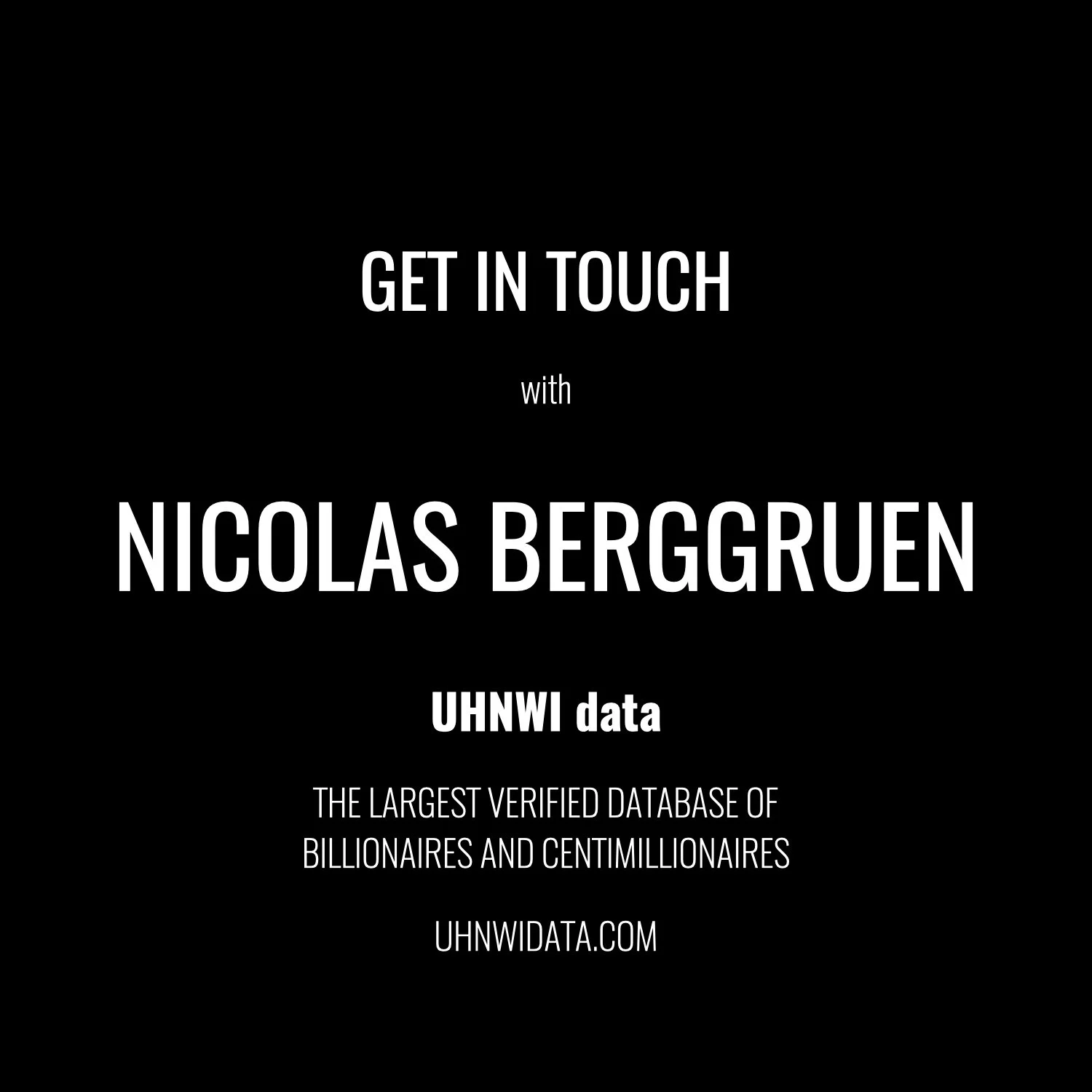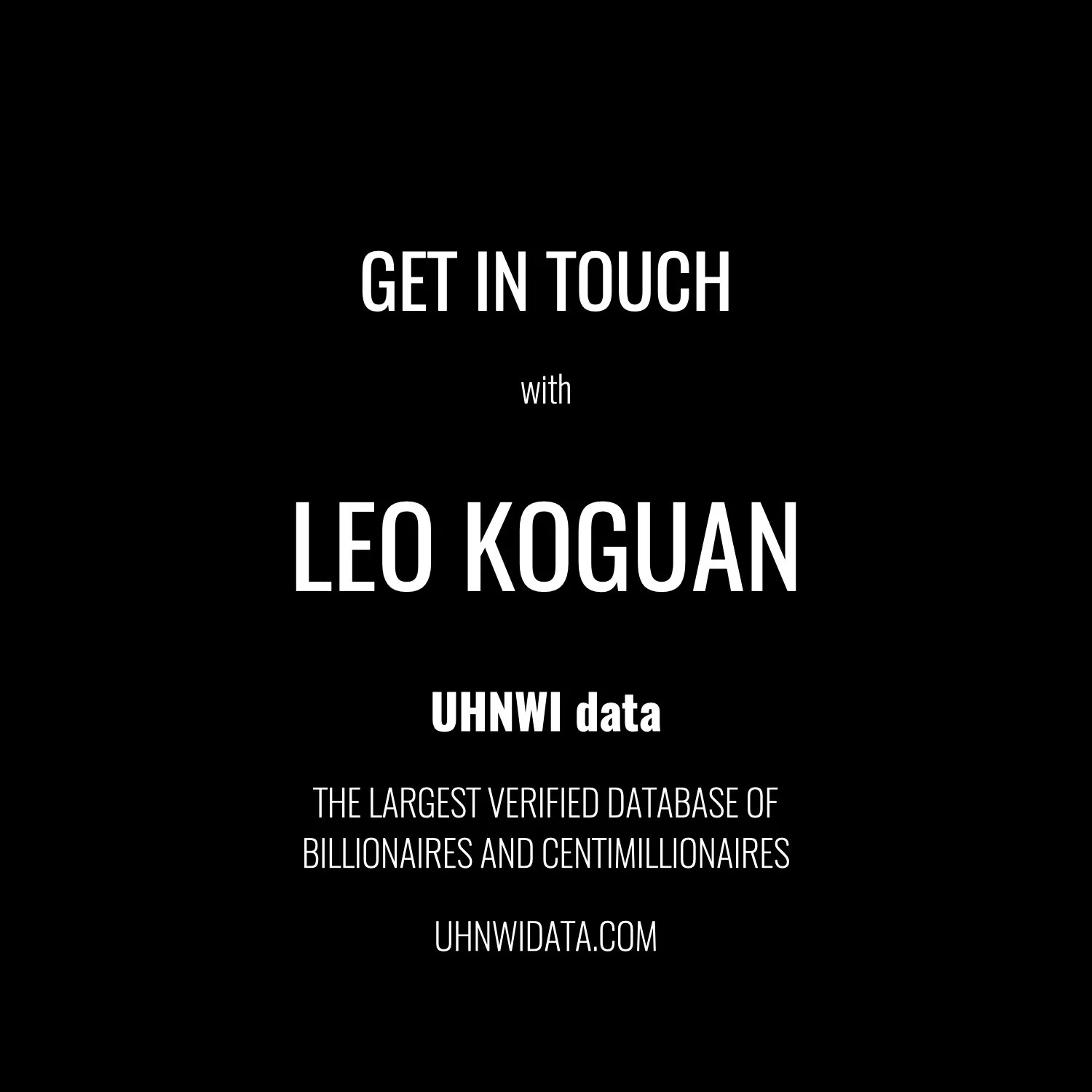Hussain Sajwani is an Emirati billionaire businessman who founded and chairs DAMAC Properties, a Dubai-based luxury real estate developer established in 2002.[1][2] Born in 1956 in Dubai, Sajwani graduated from the University of Washington and began his career in the food services industry before working as a contracts manager for GASCO, a subsidiary of Abu Dhabi National Oil Company.[3][4] Leveraging Dubai's property boom in the early 2000s, he transformed DAMAC into a major player, completing over 200 projects and serving more than 150,000 customers with high-end residential, commercial, and hospitality developments, including branded properties in partnership with figures like Donald Trump.[5][6] As of October 2025, Sajwani's net worth stands at $10.2 billion, primarily derived from his ownership of DAMAC Group, which has expanded into data centers and other sectors amid global diversification efforts.[1] His career includes notable controversies, such as a 2011 Egyptian court conviction for corruption related to a government land deal, leading to temporary Canadian sanctions from 2011 to 2014, though he has denied wrongdoing and continued business expansion.[7][8]
Early life and education
Family and upbringing
Hussain Sajwani was born in 1953 in Dubai to a middle-class, business-oriented family as the eldest of five children.[9] His father operated a trading shop in the Deira Souq, selling imported goods such as watches, Parker pens, shirts, and items sourced from China, exemplifying bootstrapped entrepreneurship in Dubai's nascent commercial landscape.[10] [11] His mother supplemented the household income by selling fabrics and household products door-to-door to neighborhood women, reflecting the family's collective involvement in small-scale trade.[10] [11] [9]
From age three, Sajwani contributed to his father's shop after school hours, handling tasks in an environment open from 7 a.m. to midnight daily, which exposed him to the rigors of commerce amid a modest household.[11] Family dynamics centered on business discussions, including at dinnertime, under a tough, entrepreneurial father who enforced discipline through corporal punishment for errors, instilling frugality—such as sourcing materials wholesale—and resilience despite the harsh conditions.[10] [11]
This upbringing occurred as Dubai transitioned from a pearling and trading-dependent economy—where family groups pooled resources for seasonal ventures—to modernization spurred by declining pearl markets in the early 1950s and emerging oil influences by the late 1960s, fostering a cultural emphasis on adaptive trade and self-reliance that shaped Sajwani's commercial acumen.[12] [13]
Academic background and early influences
Hussain Sajwani pursued higher education in the United States, enrolling at the University of Washington in Seattle, where he earned a bachelor's degree in economics in 1981.[2] His studies emphasized industrial engineering principles alongside economic theory, providing foundational knowledge in operational efficiency, supply chain logistics, and market dynamics that contrasted with the nascent business environment back home in the UAE.[14] This curriculum exposed him to Western analytical approaches to resource management and enterprise, honing skills in quantitative analysis and process optimization essential for scaling operations in resource-constrained settings.[15]
During his time abroad, Sajwani gained practical insights into global trade and contractual frameworks through university coursework and the broader American economic landscape of the late 1970s oil boom era, which highlighted opportunities in logistics amid international geopolitical shifts.[1] These experiences foreshadowed potential applications in conflict-driven supply demands, such as those emerging in the Gulf region, without direct involvement at the time. The interdisciplinary nature of his program instilled a pragmatic mindset toward risk assessment and venture initiation, bridging theoretical economics with engineering's focus on tangible execution.[14]
Upon returning to the UAE post-graduation, Sajwani applied his acquired expertise in logistics and management to local challenges, leveraging the structured problem-solving from his U.S. education to navigate emerging opportunities in a diversifying economy.[16] This academic grounding equipped him with tools for independent analysis of market gaps, setting the foundation for self-directed business pursuits rather than reliance on familial or governmental structures.[2]
Pre-real estate career
Trading and catering ventures
Hussain Sajwani was raised in a Dubai trading family, with his father operating a modest shop that imported watches and other goods from China, instilling early lessons in commerce, negotiation, and cross-border supply chains. Building on this foundation, Sajwani leveraged regional economic expansion in the 1980s to enter independent ventures, focusing on scalable service provision amid oil-driven infrastructure booms.[17]
In 1982, Sajwani established a catering business that quickly secured contracts with energy firms, government bodies, and international clients, including the U.S. military during the 1990–1991 Gulf War. These agreements involved delivering meals to thousands of troops in arid desert conditions, requiring robust logistics for kitchen setups, food distribution, and rapid scaling under operational constraints. A key example was a contract to supply pizzas, where daily orders reached 10,000 units, enabling $10 profit margins per item through efficient production and delivery despite the challenges of temporary military camps.[18][17][19]
The venture expanded across the Gulf, peaking at over 150,000 meals served daily, which cultivated a track record for reliability in high-volume, demanding environments. By prioritizing cost-effective supply chains and opportunistic bidding on defense-related needs, Sajwani generated substantial revenues—reportedly in the millions—demonstrating how targeted efficiency in undervalued sectors like wartime logistics could yield competitive advantages in emerging markets. The business also catered to firms like Bechtel, further diversifying revenue while honing operational expertise transferable to larger enterprises.[17][1]
Entry into construction and initial successes
Following the success of his catering business, which provided services to the U.S. military during and after the 1990-1991 Gulf War as well as to construction firm Bechtel, Sajwani leveraged accumulated capital and operational insights into logistics and project demands to enter the construction sector in the mid-1990s.[10][1] This experience supplied practical knowledge of construction economics, including supply chain efficiencies and cost structures in Dubai's emerging infrastructure landscape, where post-war regional stability facilitated rapid urban expansion.[10]
Sajwani's initial foray involved small-scale development, beginning in 1996 with the construction of three-star hotels in Dubai's Deira district to house growing numbers of traders and business visitors amid the emirate's diversification from oil dependency.[20][11] He completed five such projects through a straightforward model of building, leasing for short-term revenue, and selling upon completion, scaling incrementally while navigating Dubai's regulatory environment, which at the time favored state-linked entities but allowed private operators flexibility in niche segments like hospitality infrastructure.[11][10] These ventures yielded profits without heavy reliance on government contracts, mitigating risks from bureaucratic delays prevalent in state-dominated economies.[11]
By the late 1990s, Sajwani had purchased additional land and properties in Dubai's souks and developing areas, positioning himself amid the emirate's infrastructure push under visionary leadership that emphasized economic liberalization.[10] The pivotal shift came with early 2000s reforms, including the 2002 introduction of freehold ownership for non-UAE nationals, which Sajwani recognized as a catalyst for explosive real estate demand, informed by his hands-on construction experience and avoidance of overregulated pitfalls.[1] This timing underscored his strategic acumen in transitioning from subcontract-like hotel builds to broader development opportunities.[11]
Founding and development of DAMAC Properties
Establishment and early projects
Hussain Sajwani established DAMAC Properties in 2002, leveraging capital accumulated from his prior ventures in trading, catering, and hotel construction to enter the luxury real estate sector. Having profited from supplying goods to the U.S. military during the Gulf War and subsequently developing and selling five three-star hotels in Dubai's Deira area starting in 1996, Sajwani directed these funds toward acquiring land for high-end residential developments.[20][21] This self-financed approach minimized reliance on external debt, allowing DAMAC to prioritize opulent designs aimed at affluent buyers.
The company's inaugural project, Marina Terrace—a 20-story residential complex in Dubai Marina—was launched in 2002 shortly after land acquisition, employing an off-plan pre-sales model that targeted expatriates seeking freehold properties in the burgeoning emirate.[22][23] This strategy capitalized on Dubai's 2002 liberalization of freehold ownership for non-citizens in designated zones, enabling rapid presales that funded construction while promising buyers high capital appreciation amid the city's economic boom driven by oil revenues and diversification efforts. Pre-sales generated substantial upfront capital, with units marketed for their proximity to emerging waterfront developments, appealing to expats who comprised the majority of Dubai's inbound investors during this period.[21]
Dubai's regulatory framework, characterized by low taxation, streamlined permitting, and government incentives for foreign investment, facilitated DAMAC's swift market penetration and scaling. By 2005, Marina Terrace was completed and handed over, marking an early milestone that validated the model's viability and positioned DAMAC as a purveyor of upscale living synonymous with exclusivity and modern amenities.[23] This success laid the groundwork for subsequent handovers, with the firm delivering thousands of units by the mid-2000s and cultivating a reputation for luxury amid the emirate's pro-business ethos that prioritized rapid infrastructure growth over stringent oversight.[24]
Key luxury developments and branding strategies
DAMAC Properties has spearheaded luxury developments such as Akoya Oxygen (now integrated into Damac Hills 2), a master-planned eco-community spanning verdant landscapes with an 18-hole championship golf course at its core, offering villas and apartments equipped with private pools, landscaped gardens, and sustainable features like energy-efficient designs.[25][26] This project emphasizes seamless integration of nature and opulence, including sub-clusters like Coursetia, Avencia, and Violet, which provide diverse housing options from townhouses to multi-bedroom villas tailored for family-oriented luxury living.[25]
Complementing these are golf-centric communities within Damac Hills, such as Golf Greens, featuring 1- to 3-bedroom apartments and townhouses overlooking the Trump International Golf Club, with amenities including aqua gardens, water walkways, and proximity to 42 million square feet of master-planned green spaces.[27][28] These initiatives underscore DAMAC's focus on resort-style living, where residents access championship golf, parks, and leisure facilities, differentiating the developments through experiential luxury rather than mere housing.[29]
In branding, DAMAC employs strategic partnerships with global luxury icons—including Versace, Fendi, Roberto Cavalli, de GRISOGONO, Bugatti, and Chelsea FC—to infuse properties with designer aesthetics and exclusivity, as seen in branded residences like Versace Home and Cavalli collections that merge high fashion with architectural innovation.[30][31] This approach positions DAMAC as an aspirational brand for international elites, leveraging bold marketing to highlight accessible entry points into premium lifestyles via flexible payment plans and high-profile endorsements, thereby validating demand through over 48,000 delivered units serving more than 150,000 customers worldwide.[32][5]
Financial growth and market expansion
DAMAC Properties, founded by Hussain Sajwani in 2002, experienced rapid revenue compounding in its early years, driven by high demand for luxury real estate in Dubai amid the UAE's economic boom. By 2008, monthly sales had reached AED 1 billion before plummeting 98% during the global financial crisis, yet the company recovered through disciplined project execution and presales, achieving annual revenues of approximately AED 7.5 billion by 2017.[33][34] This trajectory continued, with revenues exceeding AED 9.8 billion in 2024 and net profits reaching AED 2.1 billion, reflecting a sales backlog of AED 67 billion and year-over-year growth in booked revenues of 18%.[35][36]
To mitigate risks from oil price volatility, which has historically impacted GCC economies, DAMAC diversified into hospitality through its DAMAC Hotels & Resorts arm, integrating branded residences and management services that provide recurring revenue streams independent of pure property sales. This strategy aligned with broader UAE efforts to reduce oil dependence, enabling DAMAC to maintain profitability by attracting international investors less sensitive to commodity fluctuations. Empirical data from post-2014 oil downturns shows DAMAC's focus on presales—exceeding AED 20 billion in 2022—sustained cash flows, contrasting with broader market contractions.[37][34]
Within the GCC, DAMAC expanded beyond the UAE by launching projects in Saudi Arabia, including Al Jawharah in Jeddah as its inaugural venture there, emphasizing luxury developments that prioritize verifiable profitability metrics like delivery timelines over speculative pricing. This regional push reinforced DAMAC's dominance in the UAE market, where it has delivered over 46,000 units since inception and maintains a pipeline of 33,000, positioning it among the top developers by transaction volume and off-plan sales leadership.[37][38][39]
Criticisms of overleveraging, particularly around 2020-2022 amid delisting from the Dubai Financial Market, were countered by DAMAC's consistent project handovers during regional slowdowns, such as the COVID-19 period, where net debt-to-equity remained stable at 0.31x and presales visibility supported revenue forecasts of AED 13-15 billion annually by 2024. Sajwani's private ownership post-delisting enabled agile capital allocation, debunking concerns through demonstrated resilience and profit margins exceeding 20% in recent years, as opposed to peers reliant on debt-fueled expansions that faltered in downturns.[36][40][41]
International business ventures
Partnerships and overseas projects
DAMAC Properties expanded into Europe with the DAMAC Tower Nine Elms project in London's Vauxhall district, developed through its subsidiary Nine Elms Property Limited in collaboration with Versace Home for branded luxury interiors.[42][43] This 50-story residential tower, featuring studios to penthouses, represented the company's inaugural European development and adhered to UK planning regulations for pre-construction sales, including consumer protections under the Consumer Rights Act 2015, contrasting with UAE escrow requirements.[43] Handovers commenced in June 2022, delivering high-end units that diversified DAMAC's portfolio with approximately 200 branded residences overlooking the River Thames.[43]
In Asia, DAMAC pursued joint ventures for market entry, including a 2017 partnership with Singapore-based Pacific Star Development to promote and showcase its luxury properties, adapting off-plan sales strategies to Singapore's stringent Strata Titles Act and foreign ownership limits.[44] The company furthered its presence by establishing sales offices in Singapore and Beijing in May 2024 to facilitate APAC expansion, targeting mixed-use opportunities amid regional regulatory variations in pre-sale approvals and financing.[45] Completed international units from such initiatives, including early Asian outreach projects, have contributed to portfolio diversity, with DAMAC reporting over 45,000 total units delivered globally by 2025, though Middle East developments predominate.[46]
These overseas partnerships emphasized branded luxury and regulatory compliance, enabling DAMAC to navigate diverse legal frameworks for off-plan transactions—such as extended disclosure periods in Europe versus phased payments in Asia—while achieving successful project completions that enhanced revenue streams beyond core UAE operations.[45][43]
Recent US investments and data center initiatives
In January 2025, Hussain Sajwani, through his company DAMAC Properties and its data center arm DAMAC Digital (also operating as EDGNEX Data Centres), pledged at least $20 billion to develop new data centers across the United States, targeting the AI and cloud computing sectors for hyperscale operators.[47][48] The initial phase focuses on constructing facilities with 1,000 megawatts of capacity in Sunbelt and Midwest states, including Arizona, Illinois, Indiana, Louisiana, Michigan, Ohio, Oklahoma, and Texas, with designs incorporating high-performance computing and AI capabilities from the outset.[49][50]
This commitment aligns with surging demand for data infrastructure driven by artificial intelligence expansion, positioning DAMAC Digital to enter the U.S. market previously absent from its portfolio of projects in the Middle East, Southeast Asia, and Europe.[51][52] Sajwani emphasized the investment's focus on state-of-the-art facilities for high-density workloads, amid expectations of streamlined regulations under the incoming Trump administration to accelerate permitting and grid connections.[53][54] As of early 2025, the plans remain in the development stage, with no confirmed site acquisitions or memoranda of understanding publicly detailed beyond the announcement.[55]
The initiative reflects Sajwani's broader pivot toward tech-enabled infrastructure, including indirect alignments with innovation ecosystems through prior investments and partnerships, though it prioritizes private-sector deployment over policy-driven protectionism in pursuit of scalable AI growth.[6][56] Analysts note potential challenges, such as U.S. grid constraints for high-power data centers, but the scale underscores DAMAC's ambition to capture a share of the projected multi-trillion-dollar global data center market by 2030.[50][57]
Business associations and political ties
Relationship with Donald Trump
Hussain Sajwani's business relationship with Donald Trump began in 2013 when DAMAC Properties, under Sajwani's leadership, partnered with the Trump Organization to develop the Trump International Golf Club Dubai, the first Trump-branded golf course in the Middle East, as the centerpiece of the 28-million-square-foot Akoya by DAMAC residential project.[58][59] The deal involved the Trump Organization licensing its brand and providing management services for the 18-hole PGA-standard course, hotel, and spa components, while DAMAC handled construction and sales of associated luxury villas and apartments bearing the Trump name.[60][61] This collaboration generated verifiable revenue for the Trump Organization, with federal disclosures indicating payments from DAMAC between $1 million and $5 million in 2016 alone.[62]
The project expanded to include Trump-branded residences within DAMAC Hills, a larger 42-million-square-foot development, where DAMAC sold hundreds of units under the Trump marque, contributing to mutual financial gains through branding premiums in Dubai's luxury market.[63] Trump's sons, Donald Jr. and Eric, attended the February 2017 opening of the golf club, praising the UAE as a key U.S. ally amid ongoing sales activity.[63] Despite media narratives suggesting potential conflicts of interest during Trump's presidency—often amplified by outlets with documented left-leaning biases—the partnership operated at arm's length, with no evidence of policy influence or undue favoritism; Trump publicly declined a proposed $2 billion expansion deal from DAMAC in late 2016 to avoid perceptions of impropriety.[64] Sajwani maintained operational independence, as DAMAC's decisions aligned with private market incentives rather than political leverage.[65]
Following a hiatus in new joint ventures from 2017 to 2024, coinciding with Trump's White House tenure and subsequent scrutiny, the relationship revived in early 2025 with Sajwani pledging at least $20 billion for U.S. data center construction through DAMAC's EDGNEX subsidiary.[48][47] Announced by Trump on January 7, 2025, at Mar-a-Lago, the investment targets expanding AI and cloud infrastructure capacity, reflecting free-market synergies between Sajwani's global real estate expertise and U.S. tech demand without apparent government subsidies or entanglements.[51] This move underscores the partnership's commercial viability, countering skeptical portrayals in some reports by demonstrating sustained, profit-driven collaboration independent of electoral cycles.[66]
Connections to other global figures
Sajwani has cultivated relationships with United Arab Emirates leadership, leveraging proximity to Dubai's ruling Al Maktoum family to advance DAMAC Properties' projects in alignment with the emirate's economic diversification goals. These ties have facilitated endorsements for developments contributing to Dubai's status as a global hub, though specific public royal approvals remain tied to broader governmental support rather than individual decrees.[67]
DAMAC Group, under Sajwani's direction, has invested in technology ventures led by Elon Musk, including SpaceX and xAI, as part of a strategy to integrate real estate with AI and space infrastructure needs.[68][6] These investments overlap with Musk's focus on data-intensive technologies, positioning Sajwani's data center initiatives as complementary to demands from AI firms. On April 22, 2025, Sajwani met Musk and Neuralink executive Shivon Zilis at the White House for breakfast, sharing a photo of the encounter on social media, which underscored shared interests in U.S. technological expansion.[69][68]
Such alliances emphasize commercial synergies over political favoritism, with Sajwani's portfolio extending to stakes in OpenAI, further bridging real estate development with cutting-edge tech ecosystems.[68] These connections have bolstered DAMAC's pivot toward data infrastructure, attracting partnerships grounded in mutual economic incentives amid global AI growth.
Philanthropy and social contributions
Charitable initiatives
The Hussain Sajwani–DAMAC Foundation, a joint entity of the DAMAC Group and its founder, channels resources into youth empowerment programs emphasizing skills development and entrepreneurship.[70] One prominent effort involves supporting the One Million Arab Coders initiative, launched by the UAE's Mohammed bin Rashid Al Maktoum Knowledge Foundation and partnered with the Dubai Future Foundation, which targets training over 1 million Arab youth in coding to build digital competencies and entrepreneurial capabilities.[71][70]
In parallel, the foundation pledged AED 20 million toward the Dubai Schools Project in 2022, funding scholarships for eligible Emirati students to cover tuition fees starting from the 2022–2023 academic year, in collaboration with the UAE's Knowledge Fund Establishment.[70] This initiative aims to enhance access to quality education for UAE nationals, aligning with broader youth skill-building objectives.[71]
Additional funding supports entrepreneurship-linked causes, including a AED 3 million contribution to the Arab Hope Makers program in 2020, directed toward the Magdi Yacoub Global Heart Centre project, which encourages innovative problem-solving among young participants.[71] These partnerships with UAE-based foundations underscore a targeted approach to fostering self-reliance among youth through practical training and financial aid.[70]
Educational and community support
The Hussain Sajwani – DAMAC Foundation prioritizes foundational learning and skills development to empower youth in underserved communities, including vocational training programs integrated with DAMAC Properties' regional ecosystems.[70] In 2017, the foundation supported the "One Million Arab Coders" initiative, a digital skills development effort aimed at training Arab youth in coding and technology to address employment gaps in tech sectors across the Middle East.[72] This program emphasized practical, job-oriented training over traditional academic paths, enabling rapid deployment of skills in private-sector opportunities like DAMAC's construction and property management operations.[72]
For children with special needs, the foundation has funded targeted educational resources, such as the "Adopt A Classroom" program at Al Noor Special Needs Centre in the UAE, providing specialized learning environments and care to enhance accessibility and outcomes.[73] Additional support extends to the Rashid Centre for People of Determination, incorporating therapy alongside vocational training to foster independence and integration into community roles.[74] These efforts target underserved groups within UAE communities, leveraging private funding for swift implementation without reliance on extended governmental processes.[75]
In community aid during crises, the foundation has delivered direct relief, such as partnering with Emirates Red Crescent in March 2025 to distribute 10,000 meals during Ramadan, focusing on immediate needs in low-income UAE areas.[76] For regional emergencies, DAMAC committed resources in November 2024 to the #UAEStandsWithLebanon campaign via Dubai Cares, aiding crisis-affected populations with education and welfare supplies, highlighting the agility of private philanthropy in contrast to slower institutional responses.[77]
Recognition and achievements
Awards and honors
In 2013, Sajwani was awarded Real Estate CEO of the Year at the Gulf Business Industry Awards and Property CEO of the Year at the CEO Middle East Awards, recognizing his leadership in expanding DAMAC Properties' portfolio amid Dubai's post-2008 recovery.[78]
By 2017, he topped the list of real estate CEOs in the Top CEO Awards, received the Top Property CEO Award from CEO Middle East Magazine, and earned the Arab Eagle Award for Wise Management; additionally, the Dubai Land Department conferred the Real Estate Tycoon Award, based on DAMAC's delivery of over 20,000 units and contributions to the local property sector's growth metrics.[78]
In 2018, accolades included Real Estate Legend at the Arabian Business Real Estate Awards, CEO of the Year at the National Treasure Awards, and Real Estate Business Leader of the Year at the Gulf Business Awards, reflecting sustained project completions and market expansion under his direction.[78]
Sajwani received Property Developer of the Year (UAE) at the International Business Magazine Awards in 2019, tied to DAMAC's record of on-time handovers exceeding 40,000 units by that point.[78]
Later honors encompass the Lifetime Achievement Award at the 11th Gulf Business Awards in 2023, Executive of the Year at the Big Project Middle East Awards in 2024, and Lifetime Achievement in Real Estate at the FinanceWorld UAE Realty Awards in 2025, each highlighting long-term industry impact through verifiable development outputs rather than external influences.[79][80][81]
Industry impact and rankings
DAMAC Properties, founded by Sajwani in 2002, has exerted substantial influence on Dubai's luxury real estate sector through the development of high-profile residential and commercial projects that have reshaped the city's skyline and attracted global investment.[82] The company's emphasis on off-plan sales for premium properties enabled scalable growth and market expansion, contributing to the maturation of Dubai's real estate dynamics amid economic cycles.[83] Sajwani's strategies have supported sector resilience, with DAMAC reporting record transaction volumes in 2024 and projecting continued demand driven by innovative financing and luxury branding.[82]
Sajwani's net worth, estimated at $10.2 billion as of March 2025 by Forbes, serves as a quantitative indicator of the economic value generated by his real estate innovations, having doubled from $5.1 billion the prior year amid strong market performance.[1] [84] In industry rankings, he topped Forbes Middle East's 2025 list of the region's Most Impactful Real Estate Leaders, recognizing his role in driving luxury development benchmarks across the Middle East.[85] Sajwani also ranked third on the World's Richest Arabs 2025 list, underscoring his prominence among real estate magnates in the Gulf.[86] Bloomberg placed him at #226 globally with a valuation of $13.3 billion, highlighting discrepancies in assessments but affirming his elevated status.[2]
Controversies and criticisms
Scrutiny over business pledges
In January 2025, Hussain Sajwani, through his company DAMAC Properties' data center subsidiary EDGNEX (later rebranded DAMAC Digital), pledged at least $20 billion to develop data centers across multiple U.S. states, including Arizona, Illinois, Indiana, Louisiana, Michigan, Ohio, Oklahoma, and Texas, with an initial phase targeting 1,000 megawatts of capacity and a projected total of 2,000 megawatts over four years.[47][87] The announcement, made alongside President-elect Donald Trump at Mar-a-Lago on January 7, emphasized private funding from DAMAC's $4.4 billion cash reserves and debt financing, without reliance on government subsidies.[48][66]
The pledge drew immediate skepticism from industry observers and analysts, who questioned its feasibility given DAMAC's primary focus on real estate rather than data infrastructure, as well as potential delays from U.S. grid constraints and power shortages.[55][50] Experts noted that a single large-scale data center campus could cost $5–10 billion, amplifying doubts about executing the full $20 billion commitment amid competitive land and energy demands.[66] Critics, including Emirati academic Abdulkhaleq Abdulla, highlighted the announcement's unexpected scale, pointing to DAMAC's history of project cancellations during the 2008 Dubai property downturn and prior unmaterialized international data center ambitions, such as a $3 billion pledge in Southeast Asia that has not yet scaled significantly.[66][55]
Counterarguments emphasize Sajwani's established track record in delivering large-scale real estate developments in the Gulf, where DAMAC has navigated market cycles more effectively than many state-backed initiatives that have faltered due to bureaucratic inefficiencies.[55] By mid-2025, EDGNEX/DAMAC Digital demonstrated execution capability through operational facilities exceeding 10 megawatts in Saudi Arabia, a 5-megawatt site in Thailand activated in Q1, and a $2.3 billion AI-focused data center project in Jakarta, Indonesia, with land acquired in March and first-phase operations slated for December 2026.[87][88] These steps, alongside Sajwani's personal net worth surpassing $13 billion from property successes, suggest the U.S. pledge aligns with a pattern of aggressive, privately funded expansion rather than hype, though concrete U.S. site progress remains pending as of October 2025.[55][89]
Labor practices and regional challenges
The United Arab Emirates' construction industry, which drove rapid urbanization in the 2000s and 2010s, has relied heavily on migrant workers from South Asia, comprising over 90% of the sector's labor force and facing systemic challenges such as extreme heat exceeding 45°C, recruitment debts averaging thousands of dollars per worker, and vulnerabilities under the kafala sponsorship system that historically tied workers to employers.[90][91][92] These conditions contributed to heat-related illnesses as the primary health risk for outdoor laborers, with productivity losses estimated at up to 20-30% during peak summer months due to mandatory work pauses and dehydration risks.[93][94]
DAMAC Properties, under Hussain Sajwani's leadership, encountered scrutiny over labor practices at its projects, particularly through subcontractors handling on-site work. In 2017, reports highlighted delayed wage payments—sometimes lasting months—to over 200 migrant workers from India and Bangladesh at the Trump International Golf Club Dubai, a DAMAC development managed by the Trump Organization, where laborers endured cramped housing and withheld salaries amid construction delays.[95] The primary contractor, Al Arif Group, was implicated in the payment shortfalls, with workers accruing debts from unpaid overtime and basic needs.[96] DAMAC responded by emphasizing that it commissions external contractors for labor and maintains an "impeccable record" of timely payments to them, while denying direct employment of the affected workers; no formal complaints were lodged against DAMAC by UAE authorities in this case.[97][98]
These incidents reflected broader regional patterns exacerbated by subcontracting chains, where accountability diffused across multiple entities, though private developers like DAMAC faced reputational pressures to enforce standards.[96] Post-2010 exposés, including labor unrest in 2012-2013, prompted UAE government reforms to mitigate abuses: the Wage Protection System (introduced in 2009 and expanded) mandated electronic salary transfers to curb delays, while 2011 changes allowed contract expirations to enable job switches without sponsor no-objection certificates, and 2015 policies required standardized pre-departure contracts, accommodation inspections, and bans on mid-term alterations.[90][99] By 2024, over 1,800 firms, including major constructors, registered in the Ministry of Human Resources and Emiratisation's electronic labor accommodation system to ensure compliant housing for low-wage workers, aligning with mandates for ventilation, space, and proximity to sites that DAMAC, as a licensed developer, adheres to via its supply chain oversight.[100][101]
Personal life and family
Family dynamics
Hussain Sajwani is married and has four children, all residing in Dubai.[102][103] His eldest son, Ali Sajwani, holds the position of Managing Director of Operations, Finance, and Hospitality at DAMAC Properties, reflecting early involvement in the family enterprise after graduating in economics from Northeastern University.[102][104] Ali has described the business as a "family affair," with his father incorporating family members into operational roles to foster continuity.[105]
Sajwani's daughter, Amira Sajwani, and younger sons, Abbas and Mehdi, participate in family business discussions, often initiated during meals where the founder solicits their insights on strategy and decisions.[106] This approach underscores a deliberate support network, blending familial counsel with professional input to navigate DAMAC's expansion.[106]
Succession planning at DAMAC emphasizes grooming next-generation executives, with Ali positioned as the apparent heir through his leadership in core functions, while siblings contribute to governance and talent development priorities typical of family-held conglomerates.[107] Sajwani's method prioritizes longevity and internal talent pipelines over external hires, ensuring alignment with the founder's vision amid the company's growth into luxury real estate and hospitality.[106][108]
Lifestyle and residences
Hussain Sajwani maintains his primary residence in Dubai, United Arab Emirates, including a home on Palm Jumeirah island.[109] His daily life revolves around family and professional obligations, emphasizing efficient time allocation amid entrepreneurial demands.[110] Sajwani prioritizes family interactions, such as evening routines with his children, as a core aspect of his personal habits.[111]
While based in Dubai, Sajwani engages in business-related international travel, including to the United States for investment pursuits, rather than maintaining personal properties abroad for leisure.[112] His properties align with DAMAC's luxury developments in the region, reflecting a practical approach over personal extravagance.[9]
Wealth, net worth, and legacy
Evolution of fortune
Sajwani established DAMAC Properties in 2002, leveraging Dubai's liberalization of freehold property ownership for non-Emiratis, which enabled rapid expansion into luxury real estate development from an initial investment in land acquisition.[2] His prior experience in commodities trading and catering provided seed capital, allowing DAMAC to deliver over 20,000 units in its early years and positioning Sajwani's fortune for substantial growth amid the UAE's construction boom.[1]
By 2016, Sajwani's net worth reached $3.2 billion, reflecting DAMAC's success in high-end residential towers and partnerships, such as with the Trump Organization for golf-linked projects.[113] The company's public listing on the Dubai Financial Market in 2015 facilitated capital raising, though Sajwani later privatized it in 2020 to maintain control, with his wealth tied predominantly to equity holdings rather than public shares.[114]
DAMAC resumed dividend payments in 2022, distributing $150 million after a suspension since 2018 linked to regulatory compliance challenges, bolstering Sajwani's returns from his ownership stake.[34] This period marked steady accumulation through project handovers and regional demand, though global economic pressures tempered growth until Dubai's post-pandemic recovery.
In 2025, Sajwani's fortune accelerated amid a Dubai property surge, adding approximately $9.8 billion year-to-date and elevating his net worth to $10.2 billion per Forbes estimates or $13.3 billion according to Bloomberg, sourced almost entirely from DAMAC's valuation gains in luxury developments and ventures like data centers via Edgenex Data Centres.[1][2][6] These increases stem from DAMAC's cash reserves exceeding $5 billion and robust sales, underscoring the company's resilience and Sajwani's strategic focus on high-margin assets.[55]
Broader economic influence
DAMAC Properties, under Sajwani's leadership, directly employs over 2,000 individuals, forming a core part of the UAE's real estate workforce and supporting skilled labor in development, management, and operations.[16] The company's expansive projects, including the delivery of more than 45,000 luxury residential units, have spurred indirect job creation across construction, engineering, and ancillary sectors, amplifying employment in Dubai's non-oil economy.[115]
Sajwani's trajectory from a catering business to founding a multinational real estate empire has positioned him as a model for entrepreneurship in the Arab world, encouraging regional ventures in property development and diversified investments amid economic liberalization.[17] His emphasis on innovation and market foresight, evident in DAMAC's pivot to high-end properties during Dubai's 2002 liberalization of foreign ownership, has indirectly fostered a pro-entrepreneurial culture by showcasing scalable private-sector success.[16]
Sajwani has endorsed UAE labor market reforms, such as the voluntary alternative savings scheme, which streamline business operations and bolster workforce flexibility, aligning with policies that have sustained the emirate's economic diversification beyond oil dependency.[116] These initiatives, supported by figures like Sajwani, contribute to Dubai's real estate sector—accounting for approximately 7-10% of GDP—through enhanced investor confidence and project scalability.[117] Extending this influence globally, Sajwani's pledged $20 billion investment in U.S. data centers is projected to generate thousands of jobs in technology and infrastructure, illustrating his role in cross-border economic linkages.






























